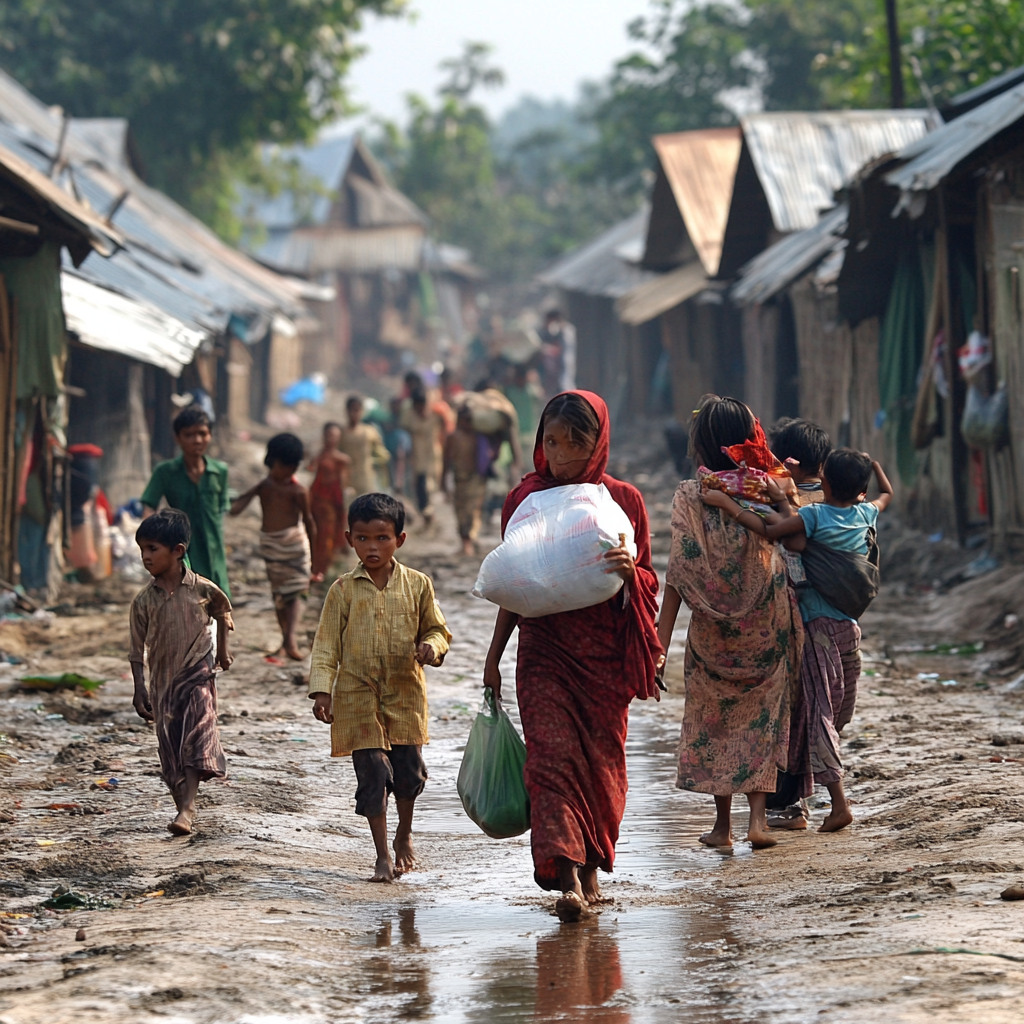By P. D. Rupasinghe, M H Thun. E. L Alison
Abstract
This paper examines the emergence and impact of the Arakan Rohingya Salvation Army (ARSA) in Myanmar's Rakhine State and beyond. Through critical analysis of existing literature, this research investigates ARSA's origins, objectives, support networks, and regional security implications. The findings suggest that while ARSA presents itself as a defensive movement fighting for Rohingya rights, its operations have paradoxically exacerbated the suffering of the very population it claims to protect. This paper argues that ARSA poses complex security challenges that extend beyond Myanmar's borders, affecting regional stability and the welfare of Rohingya refugees.
Introduction
The Arakan Rohingya Salvation Army (ARSA) emerged in 2016 as a militant group claiming to represent Myanmar's persecuted Rohingya Muslim minority. Initially known as Harakah al-Yaqin (Faith Movement), the group gained international attention following coordinated attacks on border police posts in northern Rakhine State in October 2016 and more extensive attacks in August 2017. These operations triggered disproportionate military responses from Myanmar's armed forces, resulting in what the United Nations described as "a textbook example of ethnic cleansing" (UN Human Rights Council, 2018). The subsequent mass exodus of approximately 700,000 Rohingya into neighbouring Bangladesh created one of the region's most severe humanitarian crises in recent decades. This paper critically examines the existing literature on ARSA, analysing its growth trajectory, stated objectives, support networks, and potential connections to external actors. Additionally, it investigates ARSA's impact on regional security dynamics and the welfare of Rohingya communities both within Myanmar and in refugee camps in Bangladesh.
Origins and Operational Evolution
ARSA's emergence must be understood within the context of decades of systematic discrimination against the Rohingya in Myanmar. The International Crisis Group (2016) documented that ARSA was founded by Rohingya émigrés in Saudi Arabia, led by Ataullah abu Ammar Jununi, who was born in Pakistan and raised in Saudi Arabia. The group's formation followed intensified persecution of Rohingya after the 2012 communal violence in Rakhine State, which displaced approximately 140,000 people, predominantly Rohingya (Human Rights Watch, 2013). According to Bashar (2017), ARSA's initial membership consisted primarily of local Rohingya villagers trained by a small cadre of foreign fighters with experience in modern guerrilla warfare tactics. Their first significant operation on 9 October 2016 targeted three border police posts, resulting in nine officer fatalities and the acquisition of weapons and ammunition. This attack marked ARSA's transformation from a clandestine organisation to an active insurgent force. ARSA's most consequential operation occurred on 25 August 2017, with coordinated attacks on 30 police posts and an army base. Ibrahim (2018) notes that these attacks, while militarily limited, prompted a disproportionate response from Myanmar's security forces that included mass killings, systematic sexual violence, and widespread arson of Rohingya villages. This military campaign resulted in approximately 700,000 Rohingya fleeing to Bangladesh within three months. Since late 2017, ARSA's operational capacity appears to have diminished significantly. Kyaw (2019) argues that the mass exodus of Rohingya from northern Rakhine State has deprived ARSA of its primary recruitment pool and operational base. However, Rahman (2020) documents continued ARSA activity in the Rohingya refugee camps in Bangladesh, suggesting the group has adapted its strategy rather than disbanded.
Objectives and Ideological Framework
ARSA's stated objectives present a complex picture that has evolved over time. In public communications, ARSA leadership has consistently maintained that the group fights to defend Rohingya rights and secure citizenship within Myanmar. In a March 2017 video statement, Ataullah insisted that ARSA is not a terrorist organisation but rather "a defensive group fighting against the oppression of Rohingya" (International Crisis Group, 2017). However, Chalk's (2018) analysis suggests that ARSA's objectives may be more nuanced than publicly stated. While ARSA portrays itself as a liberation movement, its operational methods indicate possible broader ambitions. Notably, ARSA has not called for an independent Rohingya state, instead focusing on recognition within Myanmar's existing borders. The group has been careful to distance itself from transnational jihadist ideologies. In interviews with Al Jazeera, Ataullah explicitly stated that ARSA rejects any affiliation with groups like Al-Qaeda or the Islamic State (Head, 2017). This positioning appears strategic, aimed at gaining international legitimacy and support. However, security analysts from the Rajaratnam School of International Studies have noted that some of ARSA's rhetoric employs religious framing that resonates with Islamic duty to defend the ummah (global Muslim community), which complicates assessments of their true ideological foundation (Bashar, 2019). What remains clear from multiple academic studies, including research published by Ware and Laoutides (2018), is that ARSA's primary mobilising narrative is centred on defending Rohingya rights rather than advancing a particular religious ideology. This positioning has allowed ARSA to present itself as a legitimate resistance movement rather than a terrorist organisation, though this characterisation remains contested in academic and policy circles.
Support Networks and External Influences
The question of who supports ARSA remains contested in academic and policy literature. The Myanmar government has consistently claimed that ARSA receives backing from international terrorist organisations and foreign states, particularly Pakistan and certain Middle Eastern countries. However, independent research has produced more nuanced findings. A study by the International Centre for Political Violence and Terrorism Research (Bashar, 2018) found limited evidence of operational links between ARSA and transnational terrorist organisations, though it noted some ideological affinity. Regarding state support, the evidence is similarly inconclusive. While various analyses have suggested that individuals in Saudi Arabia, Pakistan, and Bangladesh may provide financial support to ARSA, no definitive proof of state- level sponsorship has emerged. Hossain's (2019) investigation found that ARSA primarily relies on local taxation, extortion, and voluntary contributions from the Rohingya diaspora rather than foreign state backing. Concerning Chinese interests, research by the Institute for Security and Development Policy (Nilsen, 2018) indicates that China has little to gain from supporting ARSA, as instability in Rakhine State threatens Chinese economic investments in the region, particularly the Kyaukphyu deep-sea port and pipeline projects. Conversely, some analysts have suggested that China benefits from Myanmar's international isolation resulting from the Rohingya crisis, as it strengthens China's position as Myanmar's primary international partner (Pattanaik, 2020). However, the available evidence does not support claims of direct Chinese support for ARSA. Within the Rohingya refugee camps in Bangladesh, ARSA has established networks of influence and control, though their actual strength is disputed. Research published by Hoffstaedter and Rahim (2019) documented ARSA's presence in the camps but suggested its support among Rohingya refugees was limited and fragmented rather than widespread.
Threat Assessment and Regional Security Implications
ARSA's impact on regional security must be evaluated within the complex geopolitical landscape of Southeast Asia. The violence triggered by ARSA's attacks and the subsequent military response has created one of the largest refugee crises in the region, with significant humanitarian and security implications for Bangladesh, which now hosts over one million Rohingya refugees. Research by Bashar and Khouri (2020) has documented how the presence of ARSA members in these camps has created security challenges, including reports of intimidation, threats, and violence against camp residents who oppose their activities. These concerns have been substantiated by Human Rights Watch (2019) reports detailing ARSA's involvement in killings and abductions within the camps. From a counterterrorism perspective, a 2020 assessment by the United Nations Office on Drugs and Crime noted that while ARSA lacks the capability for sustained large-scale operations, it maintains the capacity for sporadic attacks and could potentially exploit the grievances of the marginalised Rohingya population. The research further indicates that ARSA's activities have inadvertently served as a recruitment tool for more established terrorist organisations operating in the region, including Jamaat -ul-Mujahideen Bangladesh and various Al-Qaeda affiliates, who have attempted to capitalise on the Rohingya crisis (Bashar, 2021). A particularly concerning development is the potential for radicalisation within the refugee camps, where limited prospects for repatriation or integration create conditions conducive to extremism. Multiple studies, including those by Aziz and Rainer (2020), have highlighted that the persistence of the Rohingya crisis without meaningful resolution poses a long-term security risk to the region.
ARSA's Impact on Rohingya Communities
Perhaps the most tragic dimension of ARSA's emergence is its impact on the very communities it claims to protect. Research published by Leider (2018) has documented how ARSA's attacks, while limited in scope, provided the Myanmar military with a pretext for disproportionate operations against Rohingya civilians. This resulted in mass displacement, civilian casualties, and the destruction of hundreds of Rohingya villages. Within the refugee camps in Bangladesh, ARSA's presence has contributed to insecurity among Rohingya residents. Amnesty International's 2018 report "We Will Destroy Everything" documented cases where ARSA members targeted Rohingya individuals perceived as collaborating with Myanmar authorities or opposing their agenda. Additionally, ARSA's activities have further stigmatised the Rohingya population, reinforcing harmful stereotypes of Rohingya as security threats or extremists. This has complicated international advocacy efforts for Rohingya rights and potentially undermined prospects for eventual repatriation or reconciliation. Research by Marston (2020) has observed that ARSA's emergence has resulted in a "securitisation" of the Rohingya issue, shifting focus from humanitarian concerns to counterterrorism imperatives. This has allowed regional governments to justify restrictive policies toward Rohingya refugees under the guise of security concerns.
Conclusion
This critical analysis of existing literature on ARSA reveals a complex organisation whose emergence, while rooted in legitimate grievances of the Rohingya population, has paradoxically exacerbated their suffering. The evidence suggests that ARSA lacks the operational capacity to achieve its stated objectives of securing Rohingya rights within Myanmar. Instead, its activities have provided justification for intensified persecution of Rohingya civilians and complicated international efforts to address the underlying causes of the conflict. While claims of ARSA's connections to international terrorist networks or foreign state sponsors remain largely unsubstantiated, the group nonetheless poses security challenges within refugee camps and potentially for the broader region. As the Rohingya crisis continues without resolution, the risk of further radicalisation within displaced communities cannot be dismissed. Future research should focus on developing more comprehensive understanding of ARSA's evolving strategies, particularly its activities within refugee camps, and effective approaches to addressing the legitimate grievances of the Rohingya population without further securitising the issue or marginalising an already vulnerable community.
References
Amnesty International. "We Will Destroy Everything": Military Responsibility for Crimes against Humanity in Rakhine State, Myanmar. Amnesty International, 2018.
Aziz, Z., and C. Rainer. "Security Implications of the Rohingya Crisis for Bangladesh and Regional Stability." Journal of Asian Security and International Affairs, vol. 7, no. 2, 2020, pp. 167-195.
Bashar, I. "Exploitation of the Rohingya Crisis by Jihadist Groups: Implications for Bangladesh's Internal Security." Counter Terrorist Trends and Analyses, vol. 9, no. 9, 2017, pp. 5-7.
Bashar, I. "Rohingya Crisis and Western Myanmar's Evolving Threat Landscape." Counter Terrorist Trends and Analyses, vol. 10, no. 9, 2018, pp. 12-17.
Bashar, I. "Islamic Identity Politics and the Rohingya Crisis." Journal of Muslim Minority Affairs, vol. 39, no. 4, 2019, pp. 498-514.
Bashar, I. "Rohingya Crisis and the Risk of Terrorism in Bangladesh." Counter Terrorist Trends and Analyses, vol. 13, no. 1, 2021, pp. 106-111.
Bashar, I., and R. Khouri. "Security Challenges in Rohingya Refugee Camps in Bangladesh." Studies in Conflict & Terrorism, vol. 43, no. 5, 2020, pp. 382-401.
Chalk, P. The Arakan Rohingya Salvation Army: Insurgent Group or Indigenous Rights Movement? Australian Strategic Policy Institute Special Report, 2018.
Head, J. "Rohingya Conflict: Insurgency Leader Challenges Myanmar's Aung San Suu Kyi." BBC News, 10 Mar. 2017, https://www.bbc.com/news/world-asia-39232423.
Hoffstaedter, G., and M. Rahim. "Rohingya Refugees in Camps in Bangladesh: Dilemmas of Survival and Long-Term Prospects." Journal of Refugee Studies, vol. 32, no. 4, 2019, pp. 645-662.
Hossain, D. "Who Supports the Arakan Rohingya Salvation Army?" The Diplomat, Jan. 2019.
Human Rights Watch. "All You Can Do is Pray": Crimes Against Humanity and Ethnic Cleansing of Rohingya Muslims in Burma's Arakan State. Human Rights Watch, 2013.
Human Rights Watch. "Are We Not Human?": Denial of Education for Rohingya Refugee Children in Bangladesh. Human Rights Watch, 2019.
Ibrahim, A. The Rohingyas: Inside Myanmar's Hidden Genocide. Hurst & Company, 2018.
International Crisis Group. Myanmar: A New Muslim Insurgency in Rakhine State. Asia Report No. 283, 2016.
International Crisis Group. Myanmar's Rohingya Crisis Enters a Dangerous New Phase. Asia Report No. 292, 2017.
Kyaw, N. N. "Unpacking the Presumed Statelessness of Rohingyas." Journal of Immigrant & Refugee Studies, vol. 17, no. 1, 2019, pp. 92-106.
Leider, J. P. "Rohingya: The History of a Muslim Identity in Myanmar." Oxford Research Encyclopedia of Asian History, 2018.
Marston, J. "The Rohingya Crisis: How the Securitisation of the Rohingya Affects Regional Security." The Pacific Review, vol. 33, no. 5, 2020, pp. 778-803.
Nilsen, M. "China's Security Concerns in the South China Sea: A Perspective from Myanmar." Institute for Security and Development Policy, Working Paper Series, 2018.
Pattanaik, S. S. "China-Myanmar Economic Corridor and the Rohingya Crisis." Strategic Analysis, vol. 44, no. 1, 2020, pp. 40-50.
Rahman, U. "The Rohingya Refugee: A Security Dilemma for Bangladesh." Journal of Asian Security and International Affairs, vol. 7, no. 3, 2020, pp. 238-265.
UN Human Rights Council. Report of the Independent International Fact-Finding Mission on Myanmar. A/HRC/39/64, 2018.
United Nations Office on Drugs and Crime. Transnational Organized Crime in Southeast Asia: Evolution, Growth and Impact. UNODC Regional Office for Southeast Asia and the Pacific, 2020.
Ware, A., and C. Laoutides. Myanmar's 'Rohingya' Conflict. Hurst & Company, 2018.





